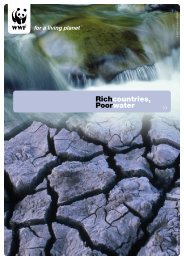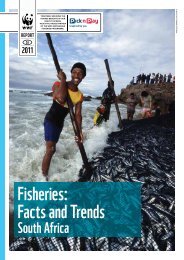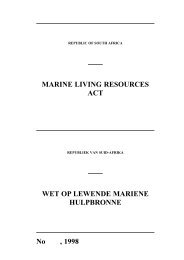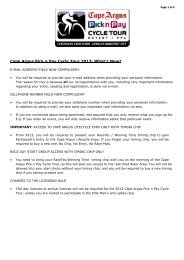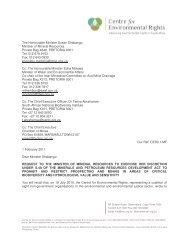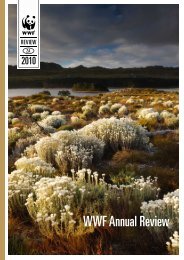State of Management of South Africaââ¬â¢s ... - WWF South Africa
State of Management of South Africaââ¬â¢s ... - WWF South Africa
State of Management of South Africaââ¬â¢s ... - WWF South Africa
- No tags were found...
Create successful ePaper yourself
Turn your PDF publications into a flip-book with our unique Google optimized e-Paper software.
STATE OF MANAGEMENT OF SOUTH AFRICA’S MARINE PROTECTED AREASthe organisations and through the appointment <strong>of</strong> dedicated marine coordinators andresearchers. CapeNature and ECPB are however still lacking these dedicated marine posts.The levels <strong>of</strong> satisfaction regarding communication and information exchange indicated bythe managers varied within the agencies. As with the previous section, this may be areflection on the managers’ communication efficiency and not that <strong>of</strong> the communication andinformation exchange strategies <strong>of</strong> the authority. It is recommended that strategies forcommunication (monthly reporting and quarterly meetings) and information exchange(databases and networks) be established within each <strong>of</strong> the authorities.9.3 MPA DESIGNThere were several MPAs in which critical areas for the maintenance <strong>of</strong> the ecologicalintegrity <strong>of</strong> the system were excluded or not afforded sufficient protection in the MPA, orwhere there was insufficient stakeholder involvement in the design <strong>of</strong> the MPA and thezonation. This has resulting in much dissatisfaction and in most cases non-compliance inmany <strong>of</strong> the MPAs. The design and zonation <strong>of</strong> these MPAs should be reviewed inconsultation with scientists and local stakeholders. Furthermore, the function <strong>of</strong> MPAs needsto be broadened (as indicated in the above legal framework section) so to provide themanagers with the authority to manage all activities in the MPA and essentially theircumulative impacts.9.4 MPA PLANS AND PLANNING PROCESSESThere has been a significant increase in the number <strong>of</strong> MPAs with management plans sincethe 2003 assessment. Most <strong>of</strong> the managers indicated that the plans were in need <strong>of</strong>improvement as they were not fully adequate. It must be noted that despite these criticisms,the formulation <strong>of</strong> management plans is a significant progress for MPA management in <strong>South</strong><strong>Africa</strong> and it is recognised that the initial plans are essentially a step in the right direction.A management plan is a tool to guide the development <strong>of</strong> operational plans by managers anda reference point for decision making. The active involvement <strong>of</strong> the MPA manager in theplanning process is crucial to ensure that the plan is <strong>of</strong> use to the manager and that theobjectives set are realistic for the available management capabilities. Most <strong>of</strong> the plansdeveloped for <strong>South</strong> <strong>Africa</strong>’s MPAs have been done so by independent parties. It wasgenerally noted that where managers were not involved in the planning process, the planswere <strong>of</strong> little use to them. This may be due to the fact that the generic language used in mostmanagement plans may be interpreted differently by the planner and the manager and,without active engagement between the two, the intent and strength <strong>of</strong> the plan may be lost.The interests <strong>of</strong> resource users and communities influence the performance <strong>of</strong> MPAs andthus should play a role in shaping the development and management <strong>of</strong> MPAs (Beaumont1997, Kelleher 1999, Pomeroy et al. 2006). A major weakness identified in a number <strong>of</strong> theplans was the limited meaningful involvement <strong>of</strong> affected local communities in the planningprocess. This may be attributed to the limited knowledge regarding local communities andconsequently a lack <strong>of</strong> understanding <strong>of</strong> how to meaningfully engage with them.Pg 145







